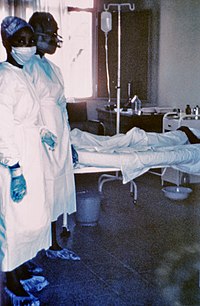
Photo from wikipedia
We sought to summarize knowledge, misconceptions, beliefs, and practices about Ebola that might impede the control of Ebola outbreaks in Africa. We searched Medline, EMBASE, CINAHL, and Google Scholar (through… Click to show full abstract
We sought to summarize knowledge, misconceptions, beliefs, and practices about Ebola that might impede the control of Ebola outbreaks in Africa. We searched Medline, EMBASE, CINAHL, and Google Scholar (through May 2019) for publications reporting on knowledge, attitudes, and practices (KAP) related to Ebola in Africa. In total, 14 of 433 articles were included. Knowledge was evaluated in all 14 articles, and they all highlighted that there are misconceptions and risk behaviors during an Ebola outbreak. Some communities believed that Ebola spreads through the air, mosquito bites, malice from foreign doctors, witchcraft, and houseflies. Because patients believe that Ebola was caused by witchcraft, they sought help from traditional healers. Some people believed that Ebola could be prevented by bathing with salt or hot water. Burial practices where people touch Ebola-infected corpses were common, especially among Muslims. Discriminatory attitudes towards Ebola survivors or their families were also prevalent. Some Ebola survivors were not accepted back in their communities; the possibility of being ostracized from their neighborhoods was high and Ebola survivors had to lead a difficult social life. Most communities affected by Ebola need more comprehensive knowledge on Ebola. Efforts are needed to address misconceptions and risk behaviors surrounding Ebola for future outbreak preparedness in Africa.
Journal Title: International Journal of Environmental Research and Public Health
Year Published: 2022
Link to full text (if available)
Share on Social Media: Sign Up to like & get
recommendations!